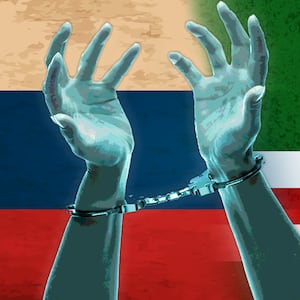GROZNY, Chechnya—A prominent human rights defender, 61-year-old Oyub Titiyev, is on trial here in the Russian republic of Chechnya, which has a notoriously authoritarian regime.
Since the day of Titiyev’s arrest last January, Dunja Mijatovic, commissioner for human rights for the Council of Europe, has been asking the Kremlin and prosecutor general of the Russian Federation to free Titiyev, head of the Chechen office of the human rights group Memorial.
Titiyev is being tried on spurious charges of drug possession, with a verdict expected on Monday.
Moscow has not listened to Mijatovic, but she does not give up.
In an exclusive interview with The Daily Beast, Mijatovic said that she had seen many men in power, including Russian officials, who managed to force strong voices to be silent. But she does not intend to let that happen.
She first took up the cause of human rights in her native country, Bosnia-Herzegovina, during the genocidal war that raged there from 1992 to 1995, and her official mission now is to protect and strengthen the system of human rights in the 47 member states of the Council of Europe, including Russia.
If there is one person who will stand up for Titiyev and for human rights, she is the one.
“In spite of the apathy we see in many countries today, we need to find a way and communicate the importance of human rights,” Mijatovic told The Daily Beast via Skype from her office in Strasboug. “I am blessed to do this with my energy and strength, devoting my expertise,” the commissioner says, then adds: “This is not easy, it’s not a glamour job.”
In Bosnia, Mijatovic created institutions to protect the rights of journalists. She served as director of broadcasting at the Communications Regulatory Agency of Bosnia and Herzegovina. She also chaired the Council of Europe’s group of specialists on freedom of information. From 2010 to 2017, she was the representative for media freedom at the Organization for Security and Co-operation in Europe (OSCE).
Still, the Russian government has tried to ignore Mijatovic. She says that sometimes the state’s officials even shout at her, but she is unrelenting.
In a letter to Russian Prosecutor General Yury Chaika Mijatovic she demanded attention be given to Titiyev’s case: “States must create an environment conducive to the work of human rights defenders, enabling individuals, groups and associations to freely carry out activities, to promote and strive for the protection of human rights and fundamental freedoms, without any restrictions,” she wrote.
Russia stopped being a fan of Mijatovic’ s institution after the annexation of Crimea in 2014, when the parliamentary assembly of the Council of Europe suspended the voting rights of Russia’s delegation. Moscow has not paid its annual €33 million ($37.4 million) fee for almost two years.
Secretary-General Thorbjorn Jagland says that if Russia does not pay up it will be excluded from the Council of Europe this year. The Russian parliament recently voted not to send a delegation to the assembly and not to pay the dues. Russian authorities remembered noted the country “could handle things before the European institution perfectly well” before Moscow decided to join the Council in 1996. But that rather misses the point.
In the 1990s, Russia wanted to be part of the West and what was considered the liberal order of the modern world. The Council of Europe, much broader than the European Union in terms of membership, was meant to represent a sphere of shared values.
But under Putin since 2000, Russia’s ambition has been to compete with the West while reviving the supposed glories of the Russian and even the Soviet empires. Its interest is no longer in uniting with Europe but in encouraging its divisions. Meanwhile in Russia, freedom of speech, of assembly and other constitutional rights are constantly violated.
One recent example is a controversial law currently awaiting President Putin’s signature: it will punish Russian citizens for disrespecting the state. By that law the Kremlin will decide who respects and who disrespects the powers that be.
Mijatovic and other human rights defenders are concerned that people like Titiyev and his Memorial group of human rights defenders, who challenge the system, could be even more isolated and more frequently deprived of justice if Russia abandons the European Convention on Human Rights and the court that monitors its application.
Last month more than 10,000 people marched in downtown Moscow carrying anti-Putin banners. The protest commemorated four years since the assassination of Russian opposition politician Boris Nemtsov.
Some protesters carried the blue flag of Europe with its circle of stars and chanted in support of Council of Europe membership.
“If Russia leaves the Council of Europe it will be a terrible blow to people's ability in Russia to seek justice at the European Court of Human Rights,” Human Rights Watch Deputy Director for Europe and Central Asia Rachel Denber told The Daily Beast.
Despite all these obstacles, Mijatovic continues to promote awareness and respect for human rights in Russia, where journalists are persecuted for words, LGBT people are hunted and murdered, convicts are tortured in prisons.
Last week she addressed Tatyana Moskalkova, the Kremlin’s high commissioner for human rights, calling on her to pay close attention to the case of Svetlana Prokopyeva, a journalist with Radio Echo of Moscow and Radio Free Europe accused by authorities of “justification of terrorism.”
Police searched Prokopyeva’s home and opened an investigation after the journalist published a column reflecting on the reasons that had led a teenager to detonate a bomb in a Federal Security Service (FSB) building in Arkhangelsk in October last year, killing himself and injuring several FSB officers.
Commissioner Mijatovic stressed that the criminal prosecution against Prokopyeva not only breaches her right to freedom of expression, but also has “a broader chilling effect on all media and journalists in the Russian Federation, by preventing them from imparting information of public interest, and interfering with the right of people to receive it.”
The Russian government consistently flouts the European Convention, and is doing so more and more, but that does not diminish its importance as standard to which Russia should be held.
Mijatovic tells The Daily Beast she is planning to visit several Russian regions this spring and also troubled Russian-backed breakaway regions in Georgia and Ukraine.
Denber notes, ”The commissioner's visit is important, because it comes at a crucial time at this point, when everyone–the government, the public–needs to be reminded that what's at stake is people's ability to protect their dignity and rights.”
The Council of Europe and the European Court of Human Rights are two of the last places where the Russian authorities are still held accountable, and where liberties supposedly protected by the Russian constitution–but in reality abused every day–are still defended.
The European Court of Human Rights could be the place where Titiyev seeks justice if he is condemned by a rigged trial here in Chechnya. In the capital, Grozny, human rights defenders are concerned that their lives will become even more dangerous once Titiyev’s trial is over.
“I officially declare to human rights activists: After the end of the trial, Chechnya will be forbidden territory for them, like it is for terrorists and extremists,” announced the region’s strongman leader, Ramzan Kadyrov.
Mijatovic says that no matter how hostile and ignorant some Russian officials are, no matter how loud they are shouting at her, trying to keep her from investigating human rights violations in their states, “They already know perfectly well that I won’t give up.”







